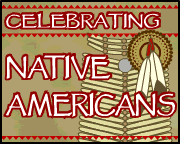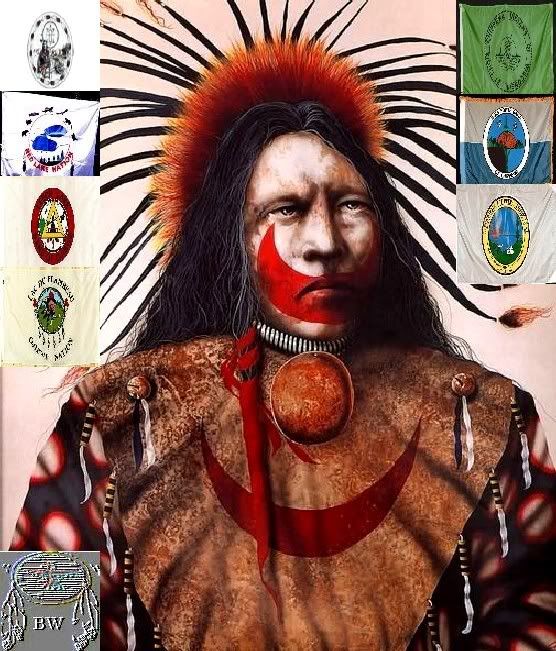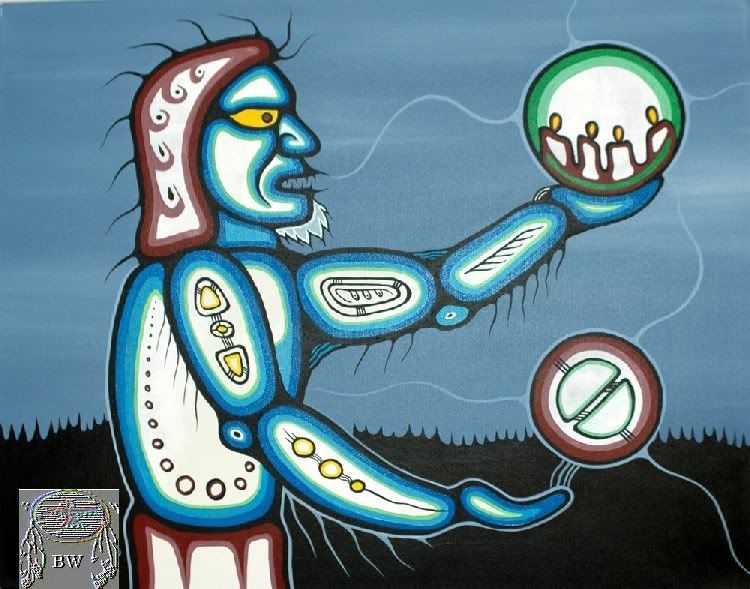|
BRAVEHORSE WARRIOR Peemeecheekag
Ojibwa Warrior

 Chief Peemeecheekag
Warrior Citation
PEEMEECHEEKAG (Pemecka, Pemicheka, Porcupine), meaning “porcupine standing sideways,” Ojibwa headman of the sucker
clan; d. in the autumn of 1891. Peemeecheekag was the leading headman and shaman in the upper Severn River district, in what
is now northwestern Ontario, during the 19th century. His roots are unknown, but his descendants say that he had mystical
origins, for it is reported that he came into the world as a fully grown man. When first seen, it is said, he was standing
on the roof of a lodge, where he declared, “They call me the Porcupine Standing Sideways, I lived before in this world,
now I am here again.” Peemeecheekag’s years in the upper Severn district were in lean times, because beaver and
caribou were scarce after a century of intensive trapping and hunting. As leader of the sucker clan, which numbered fewer
than 100 persons, he traded almost exclusively with the Hudson’s Bay Company postmaster William McKay. At Windy Lake
in 1833, McKay recorded in his journal that “no less than three whole Families, Men, Women and Children have starved
to Death.” The region around Windy, Deer, and Sandy lakes was the hunting-ground of Peemeecheekag’s clan. The
Windy Lake post was closed that year and was moved to Island Lake (Man.), where in 1839 McKay wrote that “Indians from
Sandy Lake Quarter have Brought some Furs But Chiefly Musqwuashes, they are starving hard.” When the HBC closed the
Island Lake post in 1844, Peemeecheekag and his hunters traded at Big Trout Lake (Ont.), some 150 miles to the east, and his
name appears in the hunters’ account-book kept there. Island Lake reopened in 1864 and the sucker clan returned there.
In July 1868 Peemeecheekag received credit for 63¼ made beaver in goods, including blankets, twine, files, powder and shot,
sugar, and salt. He and his clan were often hard pressed to pay off such debts. Polygamy was practised by Peemeecheekag’s
clan, and during his life he had several wives, with whom he had at least three daughters and three sons. The sons became
known as Jack Fiddler [Maisaninnine], Joseph Fiddler (Pesequan), and Peter Flett, the first two because they carved fiddles
from birch wood and played them at clan celebrations. Peemeecheekag was one of the few native headmen in the 19th century
in what is now northern Ontario who did not sign a treaty, and he was able to follow age-old traditions without interference.
His death was reported in 1891 by William Campbell, the HBC postmaster at Island Lake. Hunters from Sandy and Favourable lakes
told him that “the Bands are doing very poorly in the hunting kill owing to Sickness. They report 6 Deaths one Pemicheka
(120 years) the Chiefs Father.”
Chief Peemeecheekag
Warrior Citation
PEEMEECHEEKAG (Pemecka, Pemicheka, Porcupine), meaning “porcupine standing sideways,” Ojibwa headman of the sucker
clan; d. in the autumn of 1891. Peemeecheekag was the leading headman and shaman in the upper Severn River district, in what
is now northwestern Ontario, during the 19th century. His roots are unknown, but his descendants say that he had mystical
origins, for it is reported that he came into the world as a fully grown man. When first seen, it is said, he was standing
on the roof of a lodge, where he declared, “They call me the Porcupine Standing Sideways, I lived before in this world,
now I am here again.” Peemeecheekag’s years in the upper Severn district were in lean times, because beaver and
caribou were scarce after a century of intensive trapping and hunting. As leader of the sucker clan, which numbered fewer
than 100 persons, he traded almost exclusively with the Hudson’s Bay Company postmaster William McKay. At Windy Lake
in 1833, McKay recorded in his journal that “no less than three whole Families, Men, Women and Children have starved
to Death.” The region around Windy, Deer, and Sandy lakes was the hunting-ground of Peemeecheekag’s clan. The
Windy Lake post was closed that year and was moved to Island Lake (Man.), where in 1839 McKay wrote that “Indians from
Sandy Lake Quarter have Brought some Furs But Chiefly Musqwuashes, they are starving hard.” When the HBC closed the
Island Lake post in 1844, Peemeecheekag and his hunters traded at Big Trout Lake (Ont.), some 150 miles to the east, and his
name appears in the hunters’ account-book kept there. Island Lake reopened in 1864 and the sucker clan returned there.
In July 1868 Peemeecheekag received credit for 63¼ made beaver in goods, including blankets, twine, files, powder and shot,
sugar, and salt. He and his clan were often hard pressed to pay off such debts. Polygamy was practised by Peemeecheekag’s
clan, and during his life he had several wives, with whom he had at least three daughters and three sons. The sons became
known as Jack Fiddler [Maisaninnine], Joseph Fiddler (Pesequan), and Peter Flett, the first two because they carved fiddles
from birch wood and played them at clan celebrations. Peemeecheekag was one of the few native headmen in the 19th century
in what is now northern Ontario who did not sign a treaty, and he was able to follow age-old traditions without interference.
His death was reported in 1891 by William Campbell, the HBC postmaster at Island Lake. Hunters from Sandy and Favourable lakes
told him that “the Bands are doing very poorly in the hunting kill owing to Sickness. They report 6 Deaths one Pemicheka
(120 years) the Chiefs Father.”
 Legends of Peemeecheekag’s shamanistic abilities are told by his great-grandsons. In one, it is said Peemeecheekag saw
a windigo (a cannibalistic spirit associated with dangerous human beings) on its way to his village. He attacked the evil
creature with a whip: “The windigo’s hair stood straight up and rabbit fur grew out of its back,” and it
fled. Thereafter, “thundering noises” were heard from the place of the struggle because drops of the windigo’s
blood had fallen there. Descendants of Peemeecheekag now carry the surname Fiddler. They reside in the villages of Sandy Lake
and Bearskin Lake in Ontario and in the communities of Red Sucker Lake and those around Island Lake in Manitoba. From: historical
accounts & records
Legends of Peemeecheekag’s shamanistic abilities are told by his great-grandsons. In one, it is said Peemeecheekag saw
a windigo (a cannibalistic spirit associated with dangerous human beings) on its way to his village. He attacked the evil
creature with a whip: “The windigo’s hair stood straight up and rabbit fur grew out of its back,” and it
fled. Thereafter, “thundering noises” were heard from the place of the struggle because drops of the windigo’s
blood had fallen there. Descendants of Peemeecheekag now carry the surname Fiddler. They reside in the villages of Sandy Lake
and Bearskin Lake in Ontario and in the communities of Red Sucker Lake and those around Island Lake in Manitoba. From: historical
accounts & records
|

